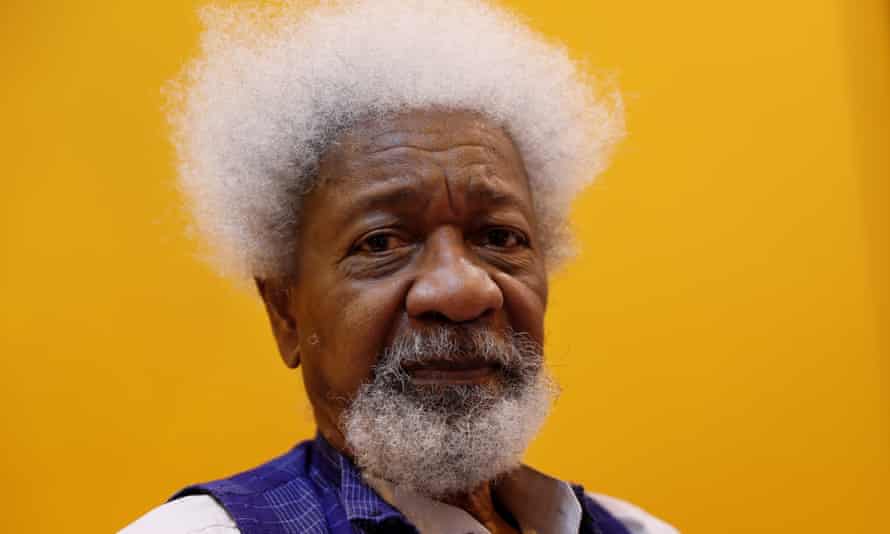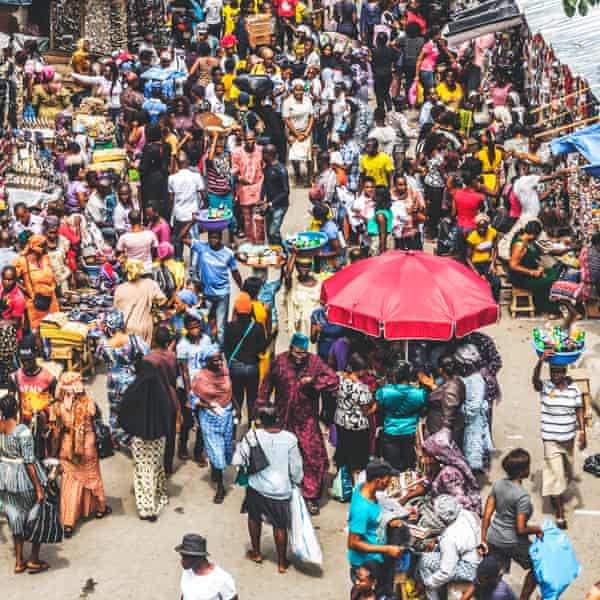Wole Soyinka: ‘This book is my gift to Nigeria’

"At 87, Wole Soyinka is a Nigerian icon. His plays have been performed around the world, his poems anthologised, his novels studied in schools and universities, while his nonfiction writing has been the scourge of many a Nigerian dictator. He was imprisoned for 22 months during the Nigerian civil war in the late 1960s for attempting to broker peace; his activism led him again into exile two decades later during the era of General Sani Abacha, military ruler of Nigeria, when the environmental activist Ken Saro-Wiwa was hanged.
In 1986, he was awarded the Nobel prize in literature and became the first African laureate, but his status in Nigerian letters was secured long before then. For a generation of young Nigerian writers, his work has been transformative. It has inspired artists, too – in Lagos, many display their skill by painting famous faces, his among them. There was even a musical duo called Soyinka’s Afro.
Born in Abeokuta, in south-west Nigeria, in 1934, Soyinka chronicled his colourful childhood in his memoir, Aké. He studied English literature at both the University of Ibadan and the University of Leeds, and now lives not far from his birthplace with his wife, Folake Doherty-Soyinka.
Chronicles from the Land of the Happiest People on Earth, Soyinka’s first novel in nearly half a century, is published in the UK this month. It is a high-jinks state-of-the-nation novel that follows a religious leader, a politician, a media baron and a group of university friends as they scheme their way through a version of present-day Nigeria. The satire and the commentary on Nigerian politics and society are trademark Soyinka. We talked in late August on Zoom; I was in London and Soyinka was at home, with bird song trilling in the background. We discussed his latest novel, his thoughts on Big Brother Africa, how far he has travelled from his childhood, and his hopes for Nigeria.
Chronicles from the Land of the Happiest People on Earth is your first novel in 48 years. Why now? What is special about this moment?
The themes in this novel have been constantly with me in various forms, from sketches and polemics to poetry. The ideas have been gathering in a cumulative fashion. And finally I just said: let me try putting all this down in prose once and for all.
The book has a large cast of characters from very different walks of life: Sir Goddie, the prime minister of this fictionalised Nigeria; engineer Pitan-Payne, crusading against corruption; Papa Davina, founder of “Chrislam”, a hybrid of Christianity and Islam – and many more. How did you keep track of them all?
That is a very good question and I’m glad you asked for the sake of young novelists who have to use this marvellous instrument called the computer. They may think that the computer is a help. Believe me, the computer can be an enemy. I’m giving you secrets of the trade, as I learned the hard way with this novel. You must number drafts very carefully. That’s the only way to do it.

Which comes first for you: plot or character?
I suspect character. Events evolve out of character more than the other way round.
Religious leaders are satirised in this novel, as they are in your play, The Trials of Brother Jero. What role do you think religion plays in Nigerian life?
Religion has been a fascinating component of my environment since childhood. At the beginning I was a believer. As a child, it was beaten into me, but as I matured, I began to look more closely at some of these claims and characters. Many of them were very colourful. As society became more materialist, more cynical, more unscrupulous, you had people taking to religion strictly for criminal business. As a writer, one is attracted by their creativity. They have more to offer in terms of drama.
I enjoyed the range of contemporary references. If you are familiar with the Nigerian political landscape, you might even recognise thinly veiled satirical characters. Did you have to research the novel, or was all the material in your mind already?
Events around me just reached a kind of crisis point. Society really became insupportable in terms of what one could absorb on a daily basis. I make no bones about it: a lot of events are taken from real life. Some characters have been taken from real life, but then fictionalised. It is one of the reasons why I aimed to release the book before the 60th anniversary of Nigerian independence. I wanted this to be my present to the nation, to the people who live here: both the governed and those who govern, the exploiters and the exploited.
The novel also has a lot of cultural references, for example to Big Brother Africa. Do you now watch Big Brother Naija [formerly Big Brother Nigeria]?
I find it nauseating. I watched Big Brother Africa out of duty when it first came out [in 2003]. My friends used to rush home. They would say: “Excuse me, I must get back. I’ve got to watch this episode.” I think I managed about two and a half episodes. But the voyeurism was totally contrary to everything I believed. So I haven’t seen the new version at all. I’m not going near it.
The title, Chronicles from the Land of the Happiest People on Earth, seems to be a critique of Nigeria: we are happy despite all that is going wrong. Fela Kuti also criticises this trait in his song Shuffering and Shmiling, where he lambasts the populace for putting up with terrible conditions. Would you describe yourself as happy?
That title came about when I read somewhere a few years ago that Nigerians were among the top 10 happiest people in the world. And I looked at that statement and thought: “What? Is this the same Nigeria we’re talking about?” So the title is meant to be ironic. It’s certainly not a truthful description of what I encounter on a daily basis or what you see when you pick up the newspapers. Am I happy? Right now, I’m very content because I’m in my environment. When I step out of this environment, my heartbeat races. So I don’t use that word, happy. And I don’t use the word unhappy. I try to attain a state of equilibrium where I can function as a human being. That’s all.
You choose to live in Nigeria when you could live anywhere in the world. Why?
I’m a lazy person. I’m accustomed to this environment. Each time I was in exile, I found I really could not feel at home elsewhere, not completely.
In the acknowledgments, you thank a colleague with a cottage in Senegal and John Agyekum Kufuor, the former president of Ghana, for giving you “creative seclusion to write this novel”. Do you feel you can’t write in Nigeria?
Oh no. I do write in Nigeria. It’s just that this particular theme required detachment from Nigeria. On my first stint in Senegal, I set down a chunk of the novel. Then I had to go back to earning a living. Believe it or not, I still have to do that, going out lecturing and so on. And then I started looking for another short stretch. President Kufuor, a friend, offered what I call his baronial house in Ghana. So I moved from that little cottage by the seaside to the lap of luxury. I was looked after hand and foot and I was very appreciative of both.

Does becoming a Nobel laureate mean that you feel more pressure when you sit down to write?
None whatsoever. I always advise the younger generation, don’t submit to pressure. If you feel pressure of the sterile kind – which is, “I ought to write, I should write” – don’t. Just go out and do something else. Immerse yourself in the environment. Go to a bar. Get drunk. Well, try not to get drunk but just do something else, something positive. Read a book, go for a walk, interact with other people, watch nature, go out in the street and walk about with people. You’ll be astonished how quickly the material starts flowing in your mind.
You’ve had many years of activism through both your words and your actions. What did you think of the recent end Sars [the Special Anti-Robbery Squad, a notorious unit of the Nigerian Police] protest, with young Nigerians calling for good governance and an end to police brutality?
That was a tragic event. It began in the heights of euphoria. I was so delighted and relieved that the young generation, whom I’ve always insulted as being lazy and waiting for salvation, got its act together and took on these brutes called the Sars. And of course, it wasn’t just the Sars. It was more than that. It was an expression of discontent. To see this structured movement, I felt rejuvenated. I said: “At last, it’s happening,” and then what happened? The thugs took over. The villains took over. The underworld got in on the act. Prisoners were let loose. It was very depressing.
Do you have hope for Nigeria’s future?
Oh, hope. Again, that’s another word that I don’t use, like happiness. When you even mention the word Nigeria, I don’t know what that is. I feel nothing for it because it’s totally diverged from what I knew as Nigeria as a child. I don’t recognise this country. That’s the truth. And so to that question, my answer is very mixed.
You always look very good. What is your secret?
You think I look good? I’ll tell my wife. I live a normal life, I hope. I eat whatever is put before me. Eba, pounded yam, rice, plantain. I have no special body care. I don’t jog. I don’t, what do they say, “work out”. From time to time, I do go out hunting. Only what’s eatable. Not trophy or safari. So maybe that’s it.
What’s your take on the contemporary African writing scene?
Very healthy. There is a marvellous crop of young writers, particularly young female writers, who really have become a pride to the continent.
Your memoir, Aké, is one of my favourite books of all time. I loved reading about your adventures with your mother, who you call Wild Christian. I wonder how you got away with that.
Let me tell you what she did one day. We launched the book in the old schoolroom in Aké where I grew up. She hadn’t read it but she’d been teased about it. And so as we returned home, amid all these people, she came to me, pretended she wanted to whisper something in my ear. Then she took my ear, twisted it and said: “That’s for Wild Christian!” So I said: “You see why I call you Wild Christian. You’ve come here to disgrace me in front of all these people.” That’s what she did.
Quick GuideSaturday magazine
Show
That’s a good story.
I gave her that name because she was a real believer. Her Christianity was a wild one. She really believed that she had a secret communication line with God. If anything went wrong she would say: “I’ve offended Papa God.” And I would say to her: “Papa God is not interested in whether or not you poured your oil in the right place or not. He’s too busy.” Then she’d chase me out. She was the genuine article. Having abandoned Christianity, I always marvelled how anybody could be so passionate. There are people like that and I respect that.
So would the young Wole Soyinka in Aké believe how far you’ve gone in life – Nobel prize, accolades, prestige?
I don’t think that’s a question I’m capable of answering. For the simple reason that I never really looked for fame. I wanted to be content and fulfilled according to my own standards. I wanted to be able to live with myself and do what I set out to do. It didn’t matter what.
No comments:
Post a Comment